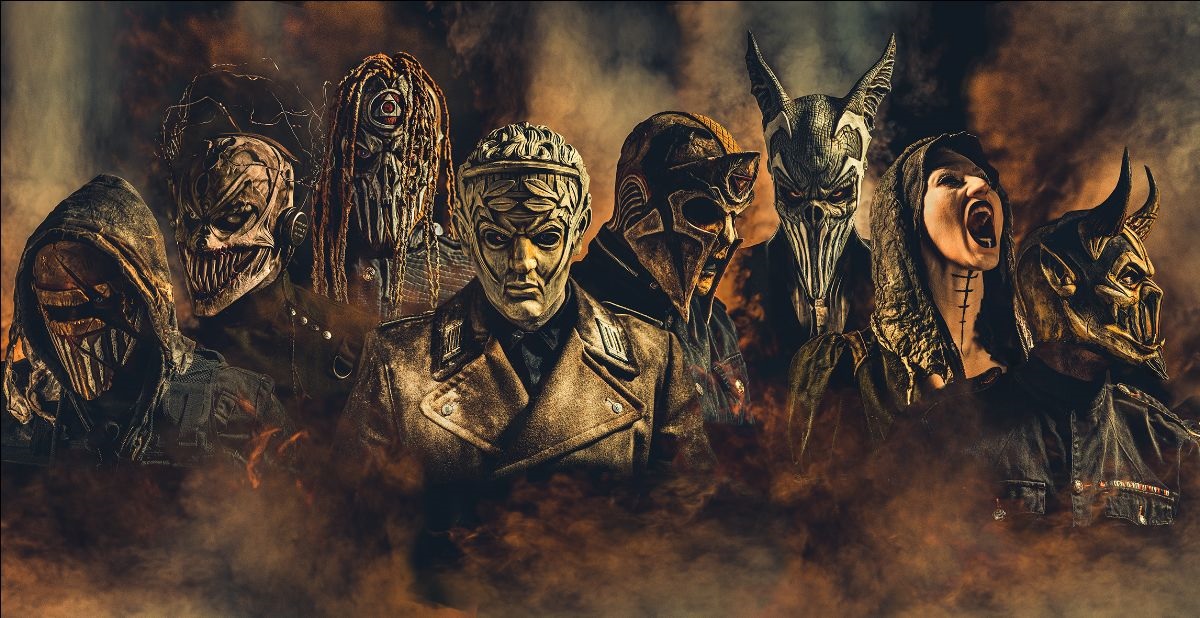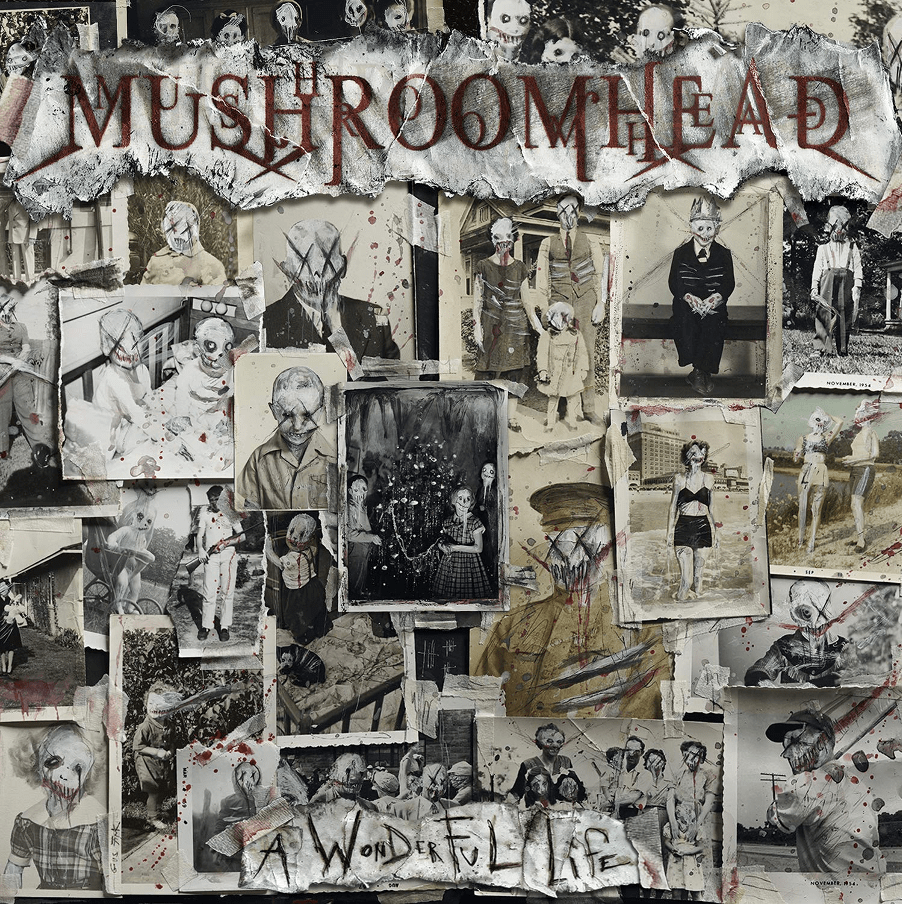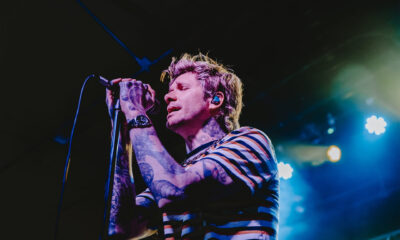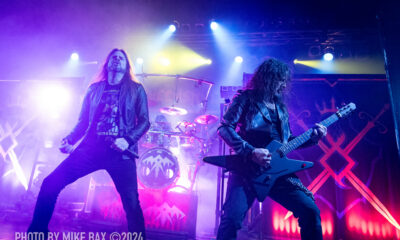Interviews
Mushroomhead’s Skinny on ‘A Wonderful Life,’ Influences, and the Bolognavirus [w/ Audio]

In the ‘90s, metal was at a crossroads. It had spread its branches from the thrash, black, doom, and death pantheon which had propelled it to a worldwide stage, and began to adopt new stylistic tendencies. California’s Korn pioneered nu-metal with their self-titled album in 1994, Deftones brought their devastating rap edge with the same year’s Adrenaline, and Slipknot was experimenting with groove, nu-metal, and electronica.
Another titan of the ‘90s was Mushroomhead, whose 1995 self-titled release contained elements of the aforementioned outfits with a macabre, electronic, and theatrical (bordering carnival-esque) edge which would set the tone for their career. The macabre and electronic elements, in particular, would become a point of focus over the years, with 1999’s M3 especially playing with this style. Their releases developed in depth and atmosphere, while mastering the electronic elements and solidifying moody, sinister vibes, and their growth was highlighted exponentially in 2003’s XIII and 2014’s The Righteous and the Butterfly. Lineup changes and experimentation on each record made it difficult to pinpoint their sound into a genre, but this can be seen as a plus by many, and the elements which contextualize Mushroomhead are undoubtedly recognizable upon listening to their discography.
In 2020, Mushroomhead unleashed their eighth studio album, A Wonderful Life, via Napalm Records, six years since The Righteous & The Butterfly. Shortly before the record’s release, we spoke to Mushroomhead mastermind, producer, and drummer, Skinny. In this interview we discuss the band’s influences, the approach the band took when creating A Wonderful Life, working at Abbey Road Studios, and creating content for the album during the pandemic lockdown.
How’s your day going?
Skinny: “Good, good! Beautiful weather here in Cleveland, Ohio. I’ll take it, it’s like, we get five days a year.”
We have the same thing. We had summer for about a week, and it’s gone now.
“Straight into hell, right? Nuts, and then humid, gross hot… Vietnam!”
You go to the beach for three days, and then you hide for three weeks.
“That’s it, exactly! You guys got it.”
Thank you so much for taking the time to talk about your upcoming album, A Wonderful Life. You must be pretty pumped for it?
“Yeah. You know, I’m definitely getting excited as the clock ticks down; it came pretty fast in the last stages of it. From January to now I kind of think ‘Wow, where did that go?’ Literally, January 8th we recorded some of the choir that is on the album, we actually had a real choir come in the studio, sixteen pieces, but I remember the day, it was January 8th because we were at the end of our deadline trying to get things done. I looked at the clock the other day and I was like… ‘Wow, that was six months… that’s crazy!”
Time’s becoming a bit of an illusion now. How are you feeling about the actual release? What do you think fans will think of it?
“I really like it still, especially as a producer. As a drummer, as an artist, I can nitpick anything, but as a producer, I really like the album. I’m really proud of it; I mean it as a drummer, too. I think it’s a hell of an album, I really think that there’s something for everyone, especially if you get the full-length version which is all 17 tracks; so it’s what, 71 minutes long. There really is something for everyone, man. I’m really excited.”
For sure. I’ve given it a listen and as you said, there is something for everybody. You go through a lot of different styles. That was the thing that really struck me when I was giving it a listen. You go through really anthemic stuff in “The Heresy,” then go to your macabre and heavy material in “What A Shame,” the electronic-heavy elements in “Sound of Destruction” and all through the record. With so many instrumental directions, yourself being the producer and the drummer, how do these ideas come from just an idea to the final product? Do you mainly take charge of the construction of it, or is a more collaborative thing from start to finish?
“It’s very collaborative. I’d say 80 to 90 percent is very collaborative. We all kind of look at it like we’re a bunch of Dr. Frankensteins, you know? We’re just sewing parts on a body. Someone puts on a hand, another one puts on a head, and before you know it we’ve got a monster that hopefully takes a life of its own. So yeah, it’s very collaborative, very willing to experiment kind of camp around here. There is no comfort zone, we kind of like it (like) that. I think the experimenting leads to a lot of the diversity. I’ve always called Mushroomhead a kind of junk drawer of sound, a lot of elements in there, you know? It’s all cool stuff, and just the way it comes together, it’s real important. So yeah, like I said I’ve always kind of referred to it as a junk drawer of sound.”
That makes perfect sense. There’s so much going on, but it comes together and it just works. And you mentioned that when it came to January it all became a bit hectic. It’s been six years since The Righteous and the Butterfly, so what was the process like between the release of that record and the moment you were like “Ok, let’s do album number eight?”
“You know, album number eight had been kind of lingering around for a while during the six years. There were a couple of goals in mind; obviously, to push The Righteous and the Butterfly as hard as we could in 2014, 2015, we did really well with it. Pushing it pretty hard as far as touring. One of the main things we thought about was getting that to Europe and the UK; so in 2016, I kind of made that one of our main priorities. We said ‘alright, let’s put album number eight on the back burner and let’s try and re-establish ourselves,’ and almost re-brand ourselves in Europe and the UK because it had been, what, 2002 since we had really been there. It had been so many years that our market just got overlooked. Some of it was logistics-based with our show, as far as like, we had extra percussion and water drums and things of that nature. So that took a minute to organize.
Some of it was financial-based because we’ve got so many, you know, guys, and a large crew. So it just took a minute to work it out, but I think the plan came together and we started going back there, at least once a year starting in 2016. Come 2018, we actually started speaking with Napalm Records and then decided to go, ‘Alright, cool, we have a new home, let’s get cracking on this album.’ So, December 2018 to January of 2020 was pretty much the writing and recording era of this album. A little over two years, around two years and eighteen months, whatever, and it was over the course of like four tours as well, so we did a lot of writing and recording on the road.”
With 70 minutes of material? That’s pretty impressive.
“Yeah, we felt that we should show what we’ve been up to throughout the entire session. A lot of that was based on just wanting to give the hardcore fans that have been waiting that six years a little bit extra, a little bit more. We’re not really known for including bonus tracks, so we were ‘Let’s try to mix some and give them the best mix we can, and then if they come out well enough, we’ll include them as some bonus.’ Actually, one of the tunes, ‘Another Ghost,’ it’s one of my favourite tunes on the album. I just think that when it kicks in, it’s got this really good, slutty guitar riff, and energy to it. I think that will be one, when we get our opportunity to get back out there and start touring, that’s going to be a tune that’s going to make it to the stage.”
Yeah, I was thinking that. I’ve given the record a few listens in the past week and a few moments that kind of surprised me. I pictured it in a full venue.
“Yes absolutely, the live setting on some of those things are just begging to be played out. Side-note, we haven’t played any of it live yet, so we’re dying to!”
I can imagine, especially with the current climate.
“Yeah, crazy!”
Crazy is one word. And Mushroomhead has seen a few lineup changes over the years, but A Wonderful Life introduces three new full-time members. You’ve got Mr. (Steve) Rauckhorst, Ms. Jackie on vocals, Tom Shaffner on guitar, and this is your first record since your debut without Hatrix and Tom Schmitz, right?
“Yeah, Schmitz was the keyboard, and Hatrix was vocals. Yeah, you know, Church bailed out on us too so this is the first lineup with a few new guys. Here’s another side note on the whole Mushroomhead history that, you know, we’re 27 years in, this is album number eight, so I don’t expect everyone to always know their Mushroomhead history, but when you look at it, it’s just part of the evolution and it’s not by design, it’s just how it goes. Every single release, there has never been a consecutive lineup from any consecutive albums in a row. There’s been a lineup change on every single record we’ve ever put out. Sometimes drastic, sometimes it barely even goes noticed. So, we always find it interesting to see how it’s gonna be perceived and taken, but you take off that kind of time in between six years, it gives a lot of… a lot of areas for people to compare it to (other records) I guess.
So, this one, when we were putting it together, we really did focus in on vocals, with Mr. Rauckhorst and Ms. Jackie, and really did a lot of experimenting; those guys are awesome in the studio. You know, speaking as a producer, to where they’re willing to collaborate, they’re willing to experiment, and push themselves, stay out of their comfort zone, we always try to find what is the comfort zone right away with someone and especially with singing, ‘what key are they naturally in?’ and that type of thing. So, this album threw quite a few curveballs at them; there are key changes all over this album, it’s not like everything is in B or just drop-tuned. We kind of change it up quite a bit, so it was really, really exciting to work with two new vocalists who had so much ability to bring to the table. The way they can harmonize together, the way they can stack their octaves.
You know, Jackie is on like five tunes out of 13 main tracks or whatever, but she’s only really showcased on say three; on the others, she’s more instrumental and she’s doing whispers or little stacks in the background or provides a little creepy voice, so it’s really fun to experiment with. I’m a huge fan of female vocals anyways, be it in metal or electronic or whatever, so it was really really interesting and a breath of fresh air to be able to experiment to get things that you weren’t necessarily expecting, and find that you’re raising your own bar in the process.”

Artwork for ‘A Wonderful Life’ by Mushroomhead
Yeah, that’s one thing I was going to ask. With a change in lineup pretty much every record, and how long you’ve been going for, do you reckon that’s a nod in your favour to change things up every record? How the lineup works in A Wonderful Life’s context compared to The Righteous and the Butterfly’s context?
“Yes, absolutely. You know, we just try to… we look at it that way. It’s almost, we do a lot of comparisons to Mortal Kombat or Star Wars, it’s character, it’s entertainment. Some guys come back, new costumes, new masks, new sounds to some degree. It always maintains the Mushroomhead tone and style if you will, which I guess the best way to sum it up (is) it always has a good creepy vibe to it. Somehow it just manages to have a cohesiveness and I think some of that is just because of all the experimenting. Like I said, people have come to expect the unexpected, and we end up with almost something for everyone.”
Absolutely. It’s been spinning regularly all day today.
“Right on, right on. I listened to it the other day because we were talking about possible third and fourth singles, we were going to do some more videos, and it’s a really diverse album! And it’s pretty dark, too. We were commenting that, subject matter wise on some of these songs and just the way they come across, you’d think we wrote these lyrics a couple of weeks ago but in actual it was a couple of years. There’s a lot of stuff that’s very modern and current in the messages in these tunes, so it’s kind of crazy.”
“The 11th Hour,” “The Time Has Come,” I was starting to think ‘Oh, there are some weird little parallels going on here.’ I was wondering what the initial lyrical inspirations or motivations for some of the tracks were?
“Well, you know, lyrically motivating, I think it just… the songs and I think the music really… me, as a producer, because I do get to write a lot of lyrics as well, personally music kind of takes me and will get me in the mood before I can come up with the subject matter. Like, a really good, haunting tune, for example, is the most recent single, it’s called ‘The Heresy.’ That one, the mood, we just kept calling it ‘Jackie meets Type O Negative.’ It was just a very doomy track and when it breaks down into the single piano thing, I was instantly like ‘Oh man, a girl voice would just be great right there.’ So it kind of lends itself into the direction of where it needs to go. It doesn’t always work like that, but lyrically on that one, we just had the whole ‘feed the war machine’ theme. It’s not meant to be so literal as it is to when we wrote it and put it together, it’s more of a ‘continue to just push and drive on, at any costs, continue,’ you know? That’s the main message there, but boy does it come across a lot differently when you put it in context with a video and the current state of the world. (laughs)”
Yeah… (laughs)
“Another side point about that track; the Jackie stuff and the first verse of J Mann was all tracked at Abbey Road Studios when we were in London on tour last time around. We were fortunate enough to get a studio open for the afternoon, and then we played London that night. Every time I hear that track, I just picture myself sitting back in Abbey, it’s crazy.”
What was that like? That’s a pretty iconic place; not just for artists, but for movie soundtracks, scores, all of that.
“It was amazing. Just doing the tour, they were actually setting up to do an orchestra for… I forget what movie. So, you know, to see a row of 20 U47 microphones set up was like ‘Holy…..’ It was really, really… I think it was overwhelming probably, for the first hour as we toured around and checked the whole place out. Once we sat in and we started working, we were in Studio B where they did Dark Side of the Moon (Pink Floyd), so that took like another hour to kind of go ‘Wow, I’m sitting here!’ So, again, every time I hear her first lines of that song, she says ‘We feed the war machine,’ I instantly am sitting right back in that control room. That’s one that’s gonna shake me for a while. It’s funny, I kind of look past the lyrics sometimes, that song just brings me right back to sitting in that control room.”
You must have felt like a kid in a candy store.
“Yeah! I didn’t want to leave.”
So now with Ms. Jackie and Mr. Rauckhorst, you’ve got three vocalists. What is that like for the songwriting process and also in the studio; what’s it like working with three different vocalists and structuring songs? Of course, not all three of them are on the same track, but you have to account for all their different tonalities and scales. How does that work with the band and benefit it?
“I think you hit it right on the head, because they’re not always on the same track together at the same time, even. There’s tracks that are… it’s a Jackie/Stevie track, or it’s a Jackie/J Mann, or it’s J Mann and Stevie… or, hell, ‘The 11th Hour’ is almost all just Stevie by himself and then J Mann comes in at the very end. So, again, the music kind of dictates what would be there. If something sounds kind of like an obvious chorus, right away we’re like ‘I’d love to see what Stevie and Mr. Rauckhorst would bring to the table here.’ A lot of times even, someone will write something and, for example, who’ll write a killer chorus hook would say ‘I wanna see Stevie sing this, not me,’ like ‘I wrote this for Stevie!’ So, the music definitely inspires in a really cool way, and everyone is really willing to work together and collaborate and experiment and hear each other out, try each other’s ideas.
Sometimes we find that, you know, ‘this is way more suited to a J part than a Stevie,’ even though we try different stuff. Then, it’s funny, because someone approaches… someone will have an idea, and they don’t want to hear anything anyone else did at all because it will maybe sway them into writing a certain way; some of those songs, hey, the best idea wins! You don’t always know what the best idea is, you’ve kind of got to absorb the material, and that’s another really good one with these guys. We’ve all been doing this a long time, but these guys are real patient and they will absorb their material, and then kind of come back and make a judgement on fresh ears instead of going ‘No, this is my art and it has to be this way!’ That’s not how it goes over here. Everyone’s really… they’re here for the song and to do what’s best for the actual song and the vibe because, you know, they’re just songs. If your great idea doesn’t work in this one, then we’ll make that great idea into another song… and that’s how you end up with 17 tracks, too! (laughs)”
(laughs) Yeah, you’ve clearly got a good recipe there. By the sounds of it, you guys have really streamlined in what you’re doing choreographically and with sharing ideas and coming together to make songs. So, how do you feel Mushroomhead as a collective have developed since The Righteous and the Butterfly?
“You know, it’s probably just the collective over time, I think we’re just getting better at experimenting. Utilizing some of the things that truly do work, and on this album, I think one of the strong points was man, these new singers! We’d never in the past had the ability to harmonize like that and to layer like that. What that ends up creating is dynamic and space and texture that we have never had. I mean, we’ve always had that to some degree, but this is a little deeper into it. As a producer, it is… it’s a little deeper, there’s just more depth to the… I’m not saying the writing of the songs and the lyrical content, I’m just saying the whole, the overall of the sound. Like, I’m not playing a lot of double bass drums on it, you know, I’m not (playing) blast beats… things are kind of, a little slower tempoed and wide open for the sound to be as doomy as possible. That was definitely something we were going for.”
Definitely works. You’ve mentioned before in previous interviews and other things that I’ve read online that Mushroomhead doesn’t really fit into a particular genre. There are so many influences and instrumental styles that it’s pretty impossible to pinpoint a specific area other than really calling it Mushroomhead.
How, right at the start or further on down the line, even up to A Wonderful Life, have all these different styles come to be incorporated into your music? Could you talk about some of your initial influences and how they permeated into Mushroomhead from the debut onwards?
“Well, you know, again, it lends a lot to experimenting. I’m almost 50 so I’m a ‘90s guy as far as the early metal, you know, Prong, Pantera… I was really into a lot of the electronic stuff. A lot of the hardcore, like the Gabber stuff that was coming out of Germany and Rotterdam. I’d been rinsing all that kind of stuff, man. All that really fast hardcore; that’s what got me into programming and into experimenting with digital stuff and keyboards, and really looking for those cool raves tones back in the day. So, a lot of that ‘90s influence is not just from the metal, it crosses over quite a bit, even into things like… not so much Soundgarden, but say, Temple of the Dog. That album was a huge influence on us, and that is a moody, dark, long, deep record. I think it’s one that stuck with me.
Then, you know, when you back up and look at it as a whole, that really was influential as a part of something was growing up with Pink Floyd’s The Wall; I still reference that album on anything we ever make. There’s moments, there’s Floyd moments, all over A Wonderful Life for sure. Some of that lends to Stevie, but some of it’s just the key changes and the moods and tempos that we try to use. So, those are some of my own personal influences that I’ve been able to maintain. But you’re right, as far as when we broke on the scene, it was nu-metal, but before we were on any sort of scene it was labelled ‘alternative.’ So, you know, what is it? In music, metal, whatever. I call it a junk drawer of sound, but it’s heavy, it’s dark, I think it’s very much art, more so than it is trying to be a band; we’re more Star Wars and Mortal Kombat than we are The Beatles and Metallica. It’s a different type of thing. As entertainers, we like to be entertained as well, and that’s what it is. It’s entertainment, you know?”
I completely get what you’re saying with Gabber. My introduction to digital production and all that was Psytrance and Hardcore. As soon as I heard that, I was like “I want to get into that.”
“Yeah! It’s hard not to, right? When it hits you the right way, it’s like ‘I want to do that! I want to distort kick drums, I want to run things through filters, I want to…,’ you know? (laughs)”
Exactly. Just mess around with the filters all day, make triplet beats…
“Absolutely!”
With the inability to pin Mushroomhead down to a genre and with having all these styles (in the music), do you think that’s why you were so widely accepted at the start? Instead of it just being nu-metal, alternative metal or whatever have you, there was something for everybody like you said?
“You know, it’s weird to me because I still think that some people just don’t get it. After 27 years of like ‘Alright, well then, I guess I just do things that people don’t get!,’ you know, and that’s true because it’s just art at the end of the day and I’m blessed to make any part of it. But yeah, you know, I don’t know man, it’s really really hard to pinpoint this band down. It always ends up dark, creepy, moody metal, but sometimes it’s not even really metal. It’s a little bit of a double-edged sword. I think people overlook it or just don’t get it because it’s kind of a lot to take in, but I think the people that do spend the time to absorb the material, realize that ‘Wow, this is pretty cool’ or at least it’s not what you’d normally expect from a band, so to speak. Like I said, it’s a little more ‘art’ and it’s definitely not the norm, and I think that’s why some people don’t latch onto it immediately. But the ones that do, God bless them, because man, they’re the hardcore ones and they’ve been around for almost the whole 27 years.”
Yeah, this is the 27th year you guys have been going (for) now?
“Yeah, this is the 27th year. October it’ll be 27 years of shows because I started it in ‘92 and in ‘93 we started playing out. So yeah, it’s more than half my life! (laughs)”
How do you feel looking back onto your discography now that the eighth record is nearly out? I’ve read somewhere, correct me if I’m wrong, that your second show was supporting GWAR?
“Correct. It was only like four or five days after our first show. We were very fortunate just knowing everyone on the scene, everyone who had been in other bands prior at the time. Mushroomhead was just really a studio project, and we said, ‘Hey man, these tracks are really fun, we should get together and do them live’ and, you know, the rest is history. I think it became something in and of itself, you know? It truly grew a life of its own, so it’s really… it’s a hell of a ride when I look back at the discography and when I think of putting out music for 25 years and how blessed I am, I’m real proud of it. Everyone I’ve worked with, current members, past members, labels, tour managers, man, I couldn’t have done any of this without everyone’s help; it’s always been a real art, you know? ‘Come on in and do what you can, pitch in however you feel and you can be involved’ type of camp.
We’ve had a lot of help over the years and like I said, I’m really really proud of it and especially this one. I did some really cool things, we wrote a lot of cool stuff while we were on the road, we did a lot of tracking while we were out on the road this time around, and then just being able to incorporate tracks we did at Abbey Road, and having Matt Wallace come back again after 17 years, he did the album XIII with us when we were on Universal. So again, just really really proud of this one. I think I say that every time, as far as every album… ‘Really proud of this,’ but man, again, you look at the entire discography, I’m proud of all of it and this one, in particular, is really something. I’m glad it’s finally coming out and I get to share it with the world.”
Right on. I’m really happy to hear that and you should be proud of yourself, it’s an excellent album. I love it personally.
“Yeah, I appreciate that. I look at it and I listen to it and it’s a very honest record. It’s not contrived, we’re not trying to do something. There’s a lot of experimenting and trying, but we’re not trying to be something or turn this into something it never was intended to be, you know? It still has all the roots, and we haven’t lost sight of who we are and where we are and why we’re here, so thank you.”
My pleasure. Just to round up then, what does the future hold for Mushroomhead?
“Currently, as far as I can see, we’re going to continue to work on videos while we are off tour. We do everything in-house, we’re really creative and into doing film and editing and that type of thing so we’re just going to… until we can get some solid answers about touring… most things have been postponed until 2021. There are rumours of the fall happening but I’m not going to get excited for it right now; it’s just been uncertainty as far as the touring thing goes so we can’t really get any straight answers. I almost like the approach of ‘well, let’s just postpone everything (for) a year’ and everyone can just, you’re gonna, unfortunately, have to figure it out. But, one thing we are capable of doing is making our own videos, so we’re going to focus on those at least for the summer, and see where the Corona… the Bolognavirus…ends up!”
The Bolognavirus; I’ve not heard that before but I’m taking it!
“That’s the thing, you run with it, because it is. I don’t know! I don’t know what to think anymore! The longer it goes, the worse it gets. I mean, I love some of the theories that are out there, but… yeah, it’s the Bolognavirus, gosh!”
I get you. With all the lockdowns and restrictions, I can imagine people are just getting freaky with creativity. Left, right, and centre.
“Yeah, it’s definitely overwhelming, everyone’s itching to do some stuff. I’ve been focusing on the videos mainly, so I worked on that last one, ‘The Heresy,’ right up until like, last Thursday. Literally, it was turned in the day before it went out to the world. I was down to the wire on that one (laughs)! I’m real glad to have that out and it looks really good, I’m just chopping up some promo stuff for it now. So yeah, we’re really onto the next thing. We do all our sets and costumes and masks and stuff too, so yeah, everyone’s really ready to… we’re in the mode, so we’re working on the next one now.”
Nice! Do you as a band all collaborate and make the videos yourselves and put all the ideas together? Is there any outside influence or is it purely you (Mushroomhead)?
“This time around, it is definitely purely us. As an example, the first one, ‘Seen It All’ was done right when the lockdowns happened, and everyone was super paranoid, no one was going anywhere. If you watch that video, almost every single shot, someone’s by themselves. We even locked the camera down so you could have people in the background and then crop the frame. So there’s two spots where it’s a singer and a guitar player and a singer and a guitar player that are… two of the members were in the same room at the same time, everyone else it’s totally individual. The way I cut it, I did it really fast, because it’s an up-tempo tune anyways, but I cut it fast enough and had a little storyline in there to where no one really says anything and I’m like ‘The whole thing is just…everyone’s alone!’
It was really challenging to do and stay creative and make it flow, but next time you watch that, think about it because (laughs) we were on a little lockdown and the end was super paranoid, they didn’t want to leave their fucking house, some of those guys wouldn’t even come in while half the crew was still there. Super skeleton crew, I think we had like three people on that set on the first one, as opposed to normally you’ve got about eight or twelve crew people. So, a lot of those people are our road crew as well; these guys have been with me a long time, they know how to set up a jib and run track or get a light into a position or actually bounce a fill light off of somebody’s face… like, they get it. So, we got a really good camp.
It all worked just fine. It was really challenging; I didn’t think I was going to make (the) deadline on that one, either (laughs). Because you couldn’t rent anything, either, you know? You wouldn’t hire anyone, you couldn’t rent extra lighting, you couldn’t rent extra jobs or whatever, so a lot of that was done on a straight tripod, didn’t move the camera but it ended up working to our advantage.”
Use the cards that you’re dealt, right?
“Yeah, absolutely.”
If you don’t mind me asking, if you have the time for it, how you started getting into your production and video editing? Was that part of another band or did it just come with the band?
“It came with the territory and the early ‘90s. I mean, I was a studio junkie when, in the early ‘90s, we were still tracking to tape. It’s funny, recently, Mr. Rauckhorst, Stevie, he’s another studio junkie too, he’s got his own studio in his house and I’ve got a couple of rooms over here. He just bought a 2’ tape machine, so we went back through all of my old 2’ tapes from all the side projects and all the old Mushroomhead and all that stuff. I had literally 64 two-inch tapes and we’ve dumped them all back onto Pro Tools recently. We were pretty heavy with it, but as far as my background and how I ended up into it, I was very much into the tracking and wanted to get into it, but back then it was big boards and big tape machines and all that.
What I ended up getting into was mastering, and it was just two channels at that point of, you know, it was Sound Designer 2 back then, it was DigiDesign and Avid before it was actually Pro Tools. So that was my introduction to digital recording, and then I just stepped it up and got a Pro Tools rig, went out and mixed that first album with Toby Wright in L.A. and I brought my 2’ reels with me. We had dumped those into a Pro Tools rig, and then I sat there and mixed that album with him for like five weeks, so I really got a good handle on understanding the ins and outs of Pro Tools. I remember coming back, this was 2001, and saying ‘That’s it, that’s the industry, that’s gonna be the future right there,’ and then I bought a TDM rig and used the budget from the next album instead of going out and renting a studio with an engineer. I just bought some gear and we just started doing this stuff ourselves and here we are 20 years later almost, you know?”
That says a lot. Do you think this focus on doing everything yourself has been a drive of your success and ability to work together so well?
“Yeah, well like I said before, I mentioned how this album feels real honest and I think you get that when you can absorb the material, take your time and not feel pressured. On the flip side, as a producer, I truly do like to work with other people and I would love to see what someone else could do with a lot of the ideas and things we bring to the table because I feel too close to it sometimes being in the band as well as a producer. So it’s tough for me, actually, to make the call sometimes and separate the two, the artist from the manager, decisions have to be made and especially in mixes and things, you know? ‘Is it going to be a vocal-heavy song, a lead kick drum?’ you know what I mean? That’s why you’ll even hear our mixes change from song to song slightly, because we’re not just looking for one cohesive sound for the whole thing. We try to, but it just doesn’t always end up that way.”
Yeah, especially with an album so varied. From my listening experience, it’s definitely been one of your most diverse albums stylistically, so it makes sense you’re going to change up the mixing here and there.
“Yeah, it’s funny because it’s really not by design, those things just happen. Like, ‘how did the low-end change so much in this tune?’ and it’s like ‘well, remember we pulled back…’ you know what I mean? But if you listen to the song by itself, it’s crushing, you know what I mean? When you listen to them next to each other, you notice things that change sometimes. I do, I don’t know, I have a problem with it. As a drummer, I can listen to it and say ‘man, I should have did a fill there’ or a producer I’m like ‘ah, that vocal’s now loud enough,’ you know? It’s hard. I can usually appreciate them after I put them down for a while a lot more, but this one I’m pretty proud of, I like the way it turned out.”
That’s great to hear. Yeah, you definitely should be. I’ll stop biting your ear off now and let you carry on with your day. But thank you so much for your time.
“Yeah, I’ve got another one beeping over here so I’m going to have to jump off but man, thank you so much. Great questions too, I enjoyed talking to you, man.”
Honestly, my pleasure. I’m a huge fan, it’s been great to talk to you!
“Cool, well stay safe over there.”
You too, it sounds pretty crazy over there so keep safe and I hope it eases down soon.
“Yeah, you know what? We’re from Cleveland, we’re used to it honestly (laughs). Alright, thanks again.”
-

 Alternative/Rock5 days ago
Alternative/Rock5 days agoThe Warning Shake the Foundations of a Sold-Out Leeds Stylus [Photos]
-

 Music2 weeks ago
Music2 weeks agoTake That (w/ Olly Murs) Kick Off Four-Night Leeds Stint with Hit-Laden Spectacular [Photos]
-

 Alternative/Rock5 days ago
Alternative/Rock5 days agoThe V13 Fix #011 w/ Microwave, Full Of Hell, Cold Years and more
-

 Alternative/Rock2 weeks ago
Alternative/Rock2 weeks agoThe V13 Fix #010 w/ High on Fire, NOFX, My Dying Bride and more
-

 Features2 weeks ago
Features2 weeks agoTour Diary: Gen & The Degenerates Party Their Way Across America
-

 Indie5 days ago
Indie5 days agoDeadset Premiere Music Video for Addiction-Inspired “Heavy Eyes” Single
-

 Folk6 days ago
Folk6 days agoKatherine Perkins Strikes the Right Tone with Her “Hold On” Music Video Premiere
-

 Country1 week ago
Country1 week agoBrooke Ashton Chats About Her “Someone” Single, Creative Process, and More!













